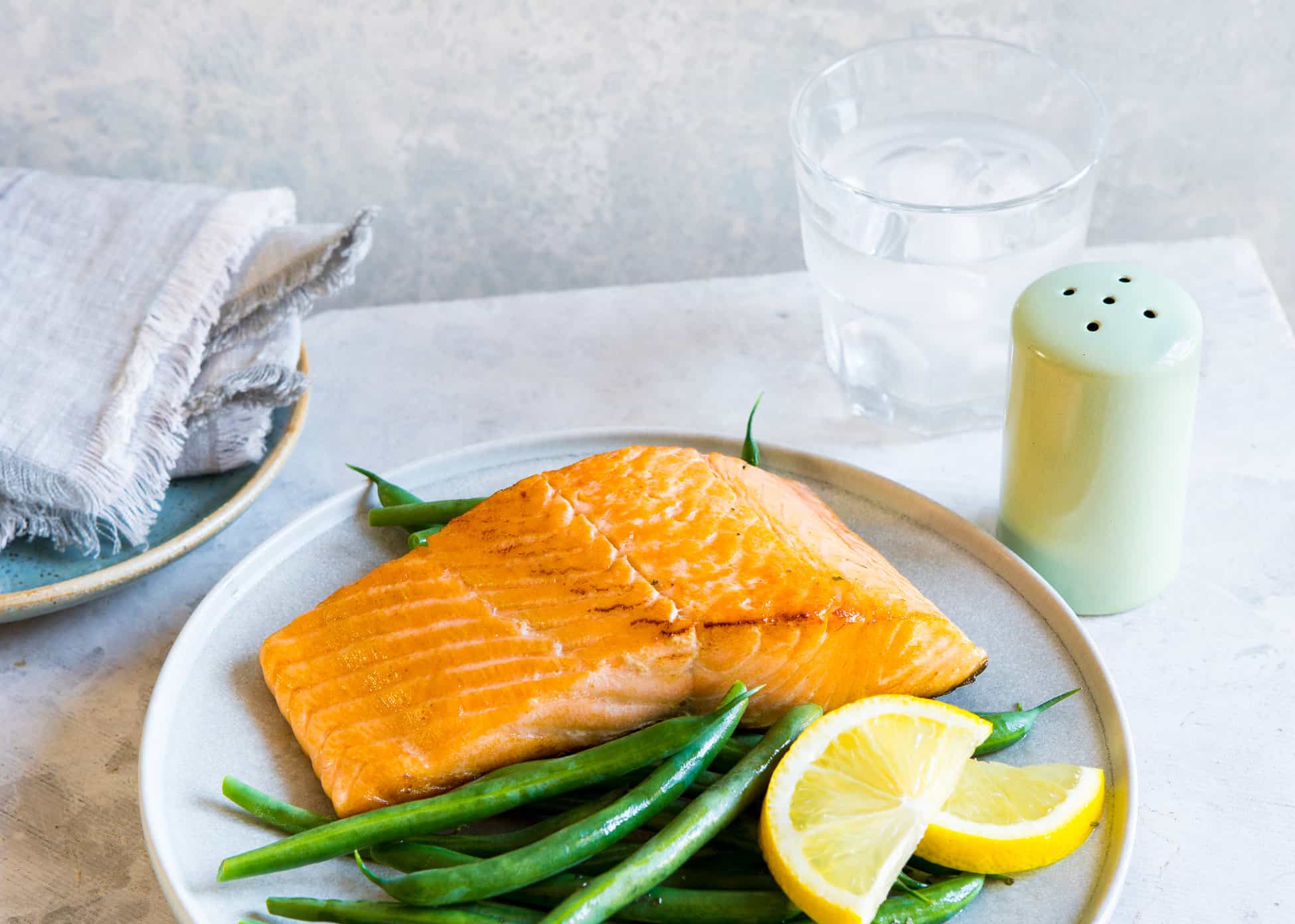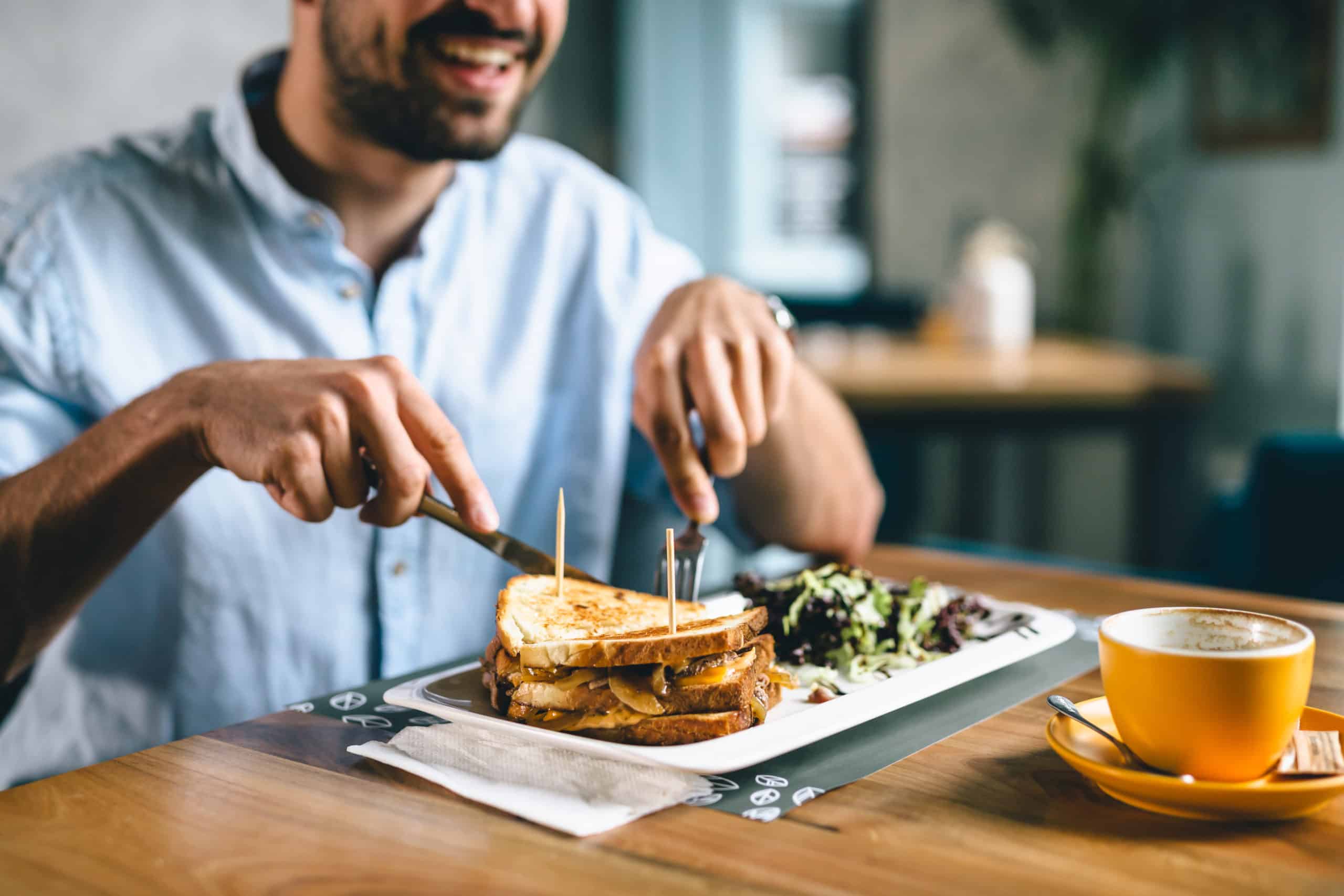What you’ll learn:
- Bananas are a nutrient-rich fruit that can be part of a balanced diet.
- Despite their higher carb content compared to some other fruits, the natural sugars in bananas are paired with fiber, which helps stabilize blood sugar and provides lasting energy.
- Bananas can fit into most eating plans, even those focused on weight loss, and are versatile enough to be included in various healthy recipes, from snacks to desserts.
Bananas are incredibly popular in America, with some statistics showing that the average person consumes about 27 pounds of bananas per year! As the most widely sold fresh fruit in the U.S., bananas are a staple in many households. However, in recent years, they’ve faced criticism from certain diets that claim they’re too high in carbs and sugar. But bananas don’t deserve this bad reputation. While no single food can guarantee weight loss, bananas can certainly be part of a balanced approach to achieving your health goals.
At Noom, we categorize bananas as a green food, meaning they are the least calorie-dense and contain the highest concentration of healthy nutrients. They boast nutrients like potassium and vitamin B6, and they’re a good source of fiber, helping you feel full and satisfied. Fresh fruits like bananas can be a healthy choice to satisfy sweet cravings.
So, if you love them, bananas can absolutely be a part of your diet. Noom’s personalized approach can help you create a sustainable eating strategy that includes all your favorite fruits.
Why bananas are good for you
Bananas are low in calories and high in nutrition. According to the USDA, a medium banana contains approximately:
- Calories: 105
- Protein: 1.3 grams
- Carbohydrates: 27 grams
- Fiber: 3 grams
- Fat: .4 grams
For just over 100 calories, for a medium banana, you also get a good dose of potassium (12% DV) and vitamin C (nearly 20% DV). They’re also a good source of vitamin B6, which is important for metabolism and energy production.
Bananas give you a good dose of fiber, about 3 grams per banana, which can help you feel full and satisfied. Fiber slows down digestion, helping to keep your blood sugar levels stable and reducing the likelihood of overeating.
Plus, the natural sugars in bananas paired with fiber provide a quick energy boost without the crash that comes from sugary snacks.
Can bananas make you gain weight?
With the popularity of low-carb diets, bananas have become a feared fruit since bananas are relatively high in carbs. Let’s peel back the layers of this misconception and see why bananas don’t deserve this label.
Having a banana per day fits well into most balanced diets. While it’s true that bananas are higher in sugar than some other fruits, their fiber slows down the absorption of sugar, leading to long-lasting energy.
Real results with a personalized weight loss program
Take the quiz!

How does eating bananas impact weight?
Like any food, eating too many bananas can contribute to weight gain if you aren’t mindful of your overall calorie intake.
The key is balance and moderation. Enjoying bananas as part of a varied diet is unlikely to cause weight gain. Their natural sweetness can help satisfy cravings for less healthy snacks, potentially supporting your weight loss efforts. You know what we’re talking about if you’ve ever blended frozen bananas into a smooth, creamy, ice-cream-like dessert.
But don’t bananas have too many carbs for weight loss?
A medium-sized banana contains about 27 grams of carbs. That might sound like a lot, but think about the big picture; for most people, this is less than 20% of their daily carb intake. These carbs come with a bundle of other nutrients that support your health and can help with weight management. It’s also important to note that the main type of carb in bananas is classified as resistant starch (especially in less ripe bananas), which functions similarly to fiber in the body and doesn’t cause blood sugar to spike rapidly.
Is it possible to eat bananas on a low-carb diet?
You can still enjoy bananas, even if you’re watching your carb intake. The key is moderation and understanding how they fit into your overall diet. While they don’t fit in with a keto diet, with a less strict low-carb plan, there’s room for a banana in your day.
How can I balance my carb intake while still enjoying bananas?
Compared to other carb sources, bananas stack up well. Plus, the carbs in bananas are paired with fiber, which slows down digestion and helps keep your blood sugar more stable.
To balance your carb intake while still enjoying bananas, try these tips:
- Include bananas as part of your pre or post-workout snack when your body can use the carbs for energy or recovery.
- Eat a banana with a protein source, like Greek yogurt or a handful of nuts, to slow down digestion, stabilize blood sugar, and keep you feeling full longer.
Are bananas high in sugar?
You might have heard that bananas are packed with sugar, but let’s check the facts first. A medium-sized banana contains about 14 grams of natural sugar. While this might seem like a lot, you’re also getting vitamins and minerals your body needs when you eat a banana.
That said, when comparing the sugar in bananas to added sugars in processed foods, they aren’t created equal. Why? The natural sugars in bananas come with nutritional benefits that you won’t find in a candy bar or soda.
Do bananas spike blood sugar levels?
While bananas contain carbohydrates that can raise blood sugar levels, they are unlikely to cause a dramatic spike. Their medium to low glycemic index means they more gradually release sugar into your bloodstream.
How many bananas should I eat a day to lose weight?
No magic amount of any type of food can guarantee weight loss. Include bananas as part of a balanced, reduced-calorie diet if you’re aiming to lose weight.
What are the best times of day to eat bananas for weight loss?
There is no wrong time of day to eat a banana, but timing when you eat a banana can optimize its benefits.
- At breakfast: Including a banana with breakfast can boost your fiber intake and promote feelings of fullness. The carbohydrates and natural sugars give you a boost of energy to get you through the day.
- Between meals: The fiber in bananas can increase feelings of fullness, which may reduce cravings between meals.
- Before a workout: Studies have shown that bananas are a cost-effective way to fuel your workout due to their unique combination of carbohydrates, nutrients, and antioxidants.
- After exercise: Bananas have been shown to improve metabolic recovery and diminish inflammation after vigorous exercise.
Unique and healthy ways to include bananas in your day
Need some ideas for incorporating bananas into your diet? Below are some healthy banana recipes to try:
- Banana and peanut butter (200 cal): A classic combo! Slice up a banana and eat it with a tablespoon of peanut butter (or your favorite nut butter) for some added protein and healthy fat.
- Banana-based smoothies (240 cal): Smoothies are a no-brainer way to add bananas to your diet. All you need to do is add a banana and your favorite ingredients to a blender and have breakfast or a snack!
- Two-ingredient banana pancakes (150 cal): These super simple pancakes use just banana and egg and can be customized with whatever toppings you like.
- Vegan savory banana fritters (235 cal): Want a banana recipe that’s savory instead of sweet? These banana fritters are packed with spices for flavor and would make a great snack or appetizer.
- Banana yogurt parfait (380 cal): Layer sliced banana and a few tablespoons of granola with low-fat Greek yogurt and drizzle honey for a quick yogurt parfait. Mix it up with your favorite toppings like fresh berries, dried coconut, or even a few dark chocolate chips.
- Banana energy bites (145 cal): For a healthy snack on the go, make a batch of these banana energy bites for a quick boost of energy between meals.
- Peanut butter banana overnight oats (370 cal): Bananas are a breakfast staple, but you can up your game by adding them to overnight oats for a filling start to your day.
- Chocolate-covered frozen bananas (255 cal): Craving a sweet treat? Try dipping a banana in melted dark chocolate and freezing it for a refreshing dessert.
- Banana ice cream: A sliced frozen banana and a good blender are all you need for this creamy dessert.
Incorporating bananas into your weight loss plan
Bananas are delicious and have a unique combination of nutrients, making them a go-to addition to your day. With just 105 calories and three grams of fiber per medium banana, they’re a filling option that supports your weight management goals. Whether you grab one as a snack or incorporate it into a new recipe, they’re a more affordable staple that will satisfy your hunger and tastebuds!
Successful weight loss isn’t about restrictions; it’s about balance and sustainability. Noom can help you seamlessly incorporate bananas into your diet. By focusing on mindful eating, building balanced meals, and tracking what you eat, you’ll develop lasting habits that fuel your health journey.






